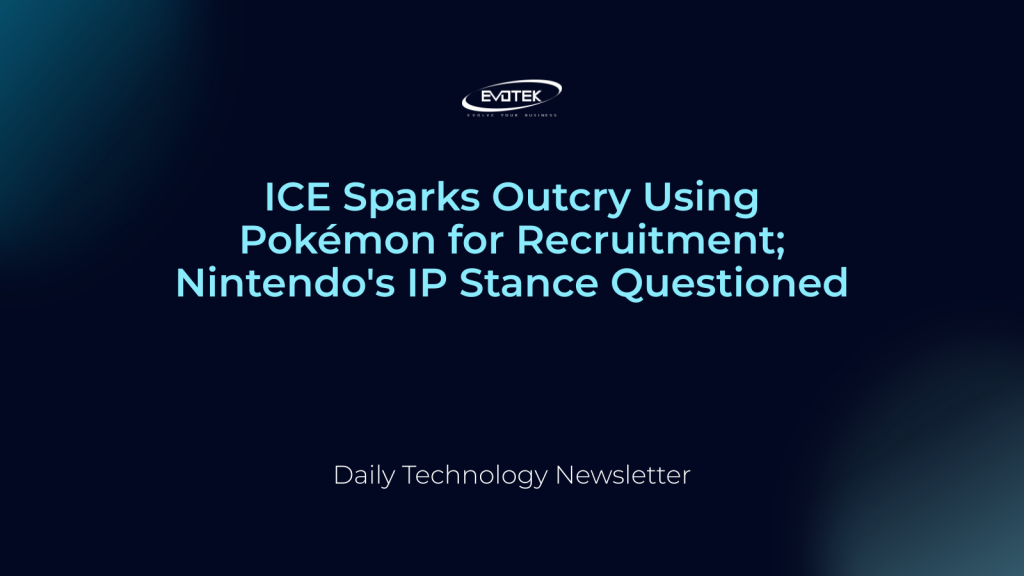Nintendo, renowned for its zealous protection of intellectual property (IP), especially its beloved Pokémon franchise, now faces a unique and highly contentious challenge. The Department of Homeland Security (DHS) has released a recruiting video that brazenly incorporates Pokémon imagery and music, transforming the serious act of immigration enforcement into what many critics describe as a “game.”
Nintendo’s Strict IP Enforcement History
For years, Nintendo has maintained a formidable reputation as an intellectual property guardian. From minor fan projects to significant unauthorized uses, the Japanese gaming giant has consistently deployed its legal teams to safeguard its iconic brands, particularly Pokémon. This steadfast approach has made them a byword for strict copyright and trademark enforcement, ensuring no potential infringement, no matter how small, goes unnoticed.
The Controversial DHS Recruitment Video
However, a recent one-minute recruitment video from the DHS’s Immigration and Customs Enforcement (ICE) arm appears to directly challenge this vigilance. The footage splices scenes of real-life arrests by U.S. officers with catchy music and clips from the popular Pokémon anime series. Further escalating the controversy, the video culminates with mock Pokémon “cards” featuring individuals allegedly arrested and deported, labeling them “worst of the worst” and detailing their supposed crimes.
Adding to the fire, the U.S. Customs and Border Protection agency even chimed in on X (formerly Twitter) with a GIF of a dancing Pikachu, declaring it “Border Patrol’s newest recruit.”
Widespread Condemnation and Ethical Concerns
The video has ignited widespread condemnation across social media and advocacy groups. Critics swiftly denounced the content as “gross” and dehumanizing, arguing that it trivializes the lives of individuals involved in immigration enforcement, regardless of alleged transgressions. The use of a “collectible” game analogy for human beings has been particularly highlighted as disturbing. Furthermore, the video rekindles scrutiny of ICE and DHS operations, including accusations of racism and lack of accountability, due to agents often concealing their identities.
A notable point of contention is an image within the video depicting a door being forcibly opened, which aligns with footage from a controversial ICE raid involving former Governor Kristi Noem. During this raid, U.S. citizens reportedly resided and were subjected to handcuffing without warrants, an incident critics have frequently cited as an abuse of power.
Legal Implications and Calls for Nintendo’s Action
Beyond the ethical uproar, legal experts and online users alike are pointing to potential trademark and copyright infringement. Numerous individuals have taken to X, directly tagging Nintendo and questioning its awareness of its intellectual property being used for what they term “ICE propaganda.” Despite the growing pressure, Nintendo has yet to issue a public statement, though The Independent has reported seeking comment from the company.
The Pokémon Company’s Stance and Expert Analysis
In a related development, The Pokémon Company, partly owned by Nintendo, released a statement acknowledging the situation and clarifying that the use of their intellectual property was “unapproved.” However, former Pokémon Company Chief Legal Officer Don McGowan offered a candid perspective to IGN, suggesting that neither The Pokémon Company nor Nintendo might pursue legal action. McGowan cited the company’s extreme publicity shyness and the green card status of many U.S. executives as potential deterrents, predicting the controversy would “blow over in a couple of days.”
The Pressure Mounts on Nintendo
This stance places significant pressure on Nintendo. Given its history of aggressive IP defense, inaction in this instance could be interpreted in two stark ways: either a tacit endorsement of ICE’s controversial recruiting tactics and the use of its property, or a concerning indication that Nintendo’s commitment to protecting its intellectual property has wavered. As the debate continues to unfold, the gaming world and beyond await Nintendo’s definitive response to this unprecedented challenge.

 日本語
日本語 한국어
한국어 Tiếng Việt
Tiếng Việt 简体中文
简体中文